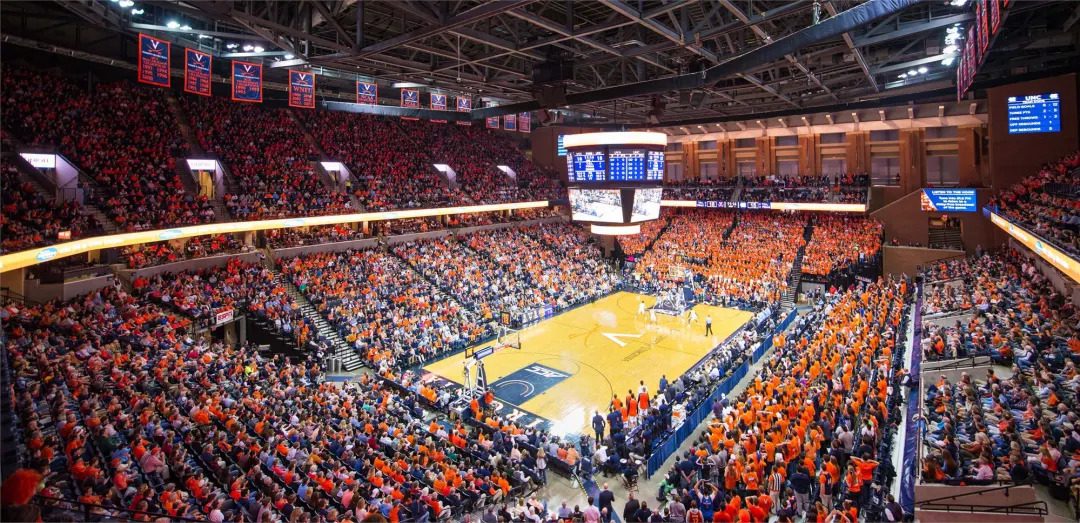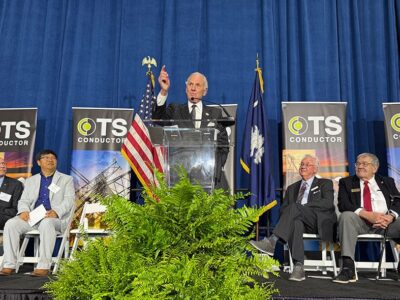John Paul Jones Arena (JPJ), perhaps best known as the University of Virginia’s (UVA) basketball venue, has been recognized for its environmental practices and commitment since 2007. It was fully certified with the Virginia Green program for its efforts involving recycling, energy and water conservation, sustainable product usage, green events, and consumer engagement.
In the 15+ years since then, the venue and UVA have continued to execute green projects, such as installing energy-saving automation systems, updating the lighting, and reducing landfill waste. Besides increasing the arena’s water efficiency, adding a bioretention area improved stormwater management.
These changes, which enhanced sustainability while lowering costs, were spotlighted in a Virginia Pollution Prevention Case Study conducted by the Virginia Department of Environmental Quality (DEQ). More energy consumption happened in 2019 with the switch to LED lighting and replacing the lighting control system.

Photo Courtesy John Paul Jones Arena
In 2009, UVA’s Athletic Department started offering fans more recycling and composting options at select games. JPJ’s concession stands currently serve its food with Eco-products®, and its suites are stocked with compostable products.
UVA Athletics got involved in the nationwide “RecycleMania” competition around 2010, and in 2013, JPJ hosted its first “Zero Waste Event.”
Although it came about due to a student-led initiative, the event wasn’t a Virginia basketball match but a Harlem Globetrotters exhibition game. This highly successful recycling effort resulted in an estimated 70% landfill diversion rate, which amounted to about a 30% higher diversion rate than a typical game.
“The students were really excited about the event, and that excitement rubbed off on the patrons, so the patrons were happy to do their part,” Jessica Wenger, environmental projects manager for UVA’s Office of Environmental Health and Safety, said at the time. “In addition to being good for the environment, it allowed students to educate the public in a friendly way that the public really seemed to respond to.”

JPJ hosted the first Zero Waste basketball game in the Atlantic Coast Conference (ACC) in 2017. UVA also did “Green Games” at select basketball and football games, and the number of games expanded in 2018, due to a push from student-athletes, with more variety of sports, getting involved.
During the 2020 basketball season, the JPJ reached a 79% waste diversion mark for that year’s Gameday Recycling Challenge, which placed them 10th in the nation and first in the ACC. Furthermore, in 2022, UVA made every home football game a “green game,” intending to decrease waste by 30% from 2010’s numbers — the same goal of the university’s campus-wide 2030 sustainability mission.
The Athletic Department shares the university’s interest in sustainability. Its work helped the UVA earn a Gold STAR from the Sustainability Tracking, Assessment & Rating System in the Association for the Advancement of Sustainability in Higher Education (AASHE) in 2021.
The Athletic Department has also implemented a policy that all new construction and major renovations be Leadership in Energy and Environmental Design (LEED)-certified and solar-ready.
Two major examples of this initiative are the new softball field, Palmer Park, which opened in 2020, and the 2019 expansion of the baseball field, Disharoon Park. Both structures earned Silver LEED certification. The department also has a Green Team Certification, where UVA sports teams earn points for completing sustainable actions.

Student-Athletes also have been a vital player in promoting UVA’s sustainability campaign, with Green Athletics, a group of student-athletic leaders, serving a particularly prominent role. Each year Green Athletics organizes events and projects that promote sustainability.
Some 2022 endeavors included educating fellow student-athletics on plant-based nutrition through sampling opportunities and hosting two Soles 4 Souls drives that let them donate shoes and clothing to those in need. The group also had a project that focused on student-athletes donating instead of throwing out items during end-of-the-semester “move-out” days.
“We can use this platform to make a difference in this world, not just at our university,” said Sadey Rodriguez, UVA track and field athlete, class of 2022.





